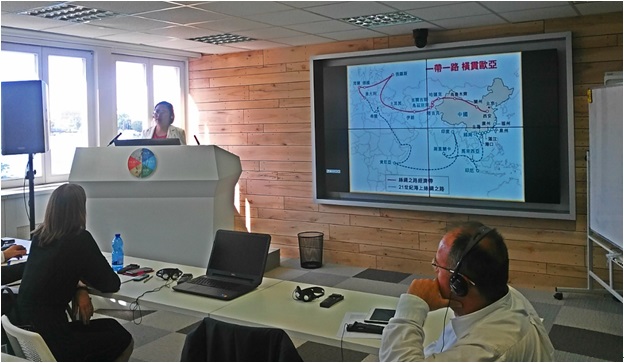Viktor Eszterhai
On June 17-20 2016, the director of Research Center for China-EU Relations of School of Social Science Tsinghua University Profeesor Zhang Lihua visited the Hungarian National Bank and the Geopolitical Institute of the Pallas Athene Geopolitical Foundation (PAGEO) in Budapest.
Professor Zhang Lihua had some fruitful discussion about scholars’ cooperation and students exchange between Tsinghua University and universities and research institutes in Hungary University with Zoltán Dubéczi, the Director for Education at the Central Bank of Hungary, Norbert Csizmadia, the Chair of Board of PAGEO and Anton Bendarjevskiy, the Director of PAGEO.
During the visit, Professor Zhang gave an opening lecture on China’s Belt and Road Initiative (OBOR). She introduced OBOR, focusing on the core ideas, the already accomplished projects and the risks and challenges.

The OBOR strategy was first announced by Chinese President Xi Jinping during his 2013 state visit to Kazakhstan. After that, in his visit to Indonesia, President Xi stressed the importance of the ASEAN-China relations and of working together on building the 21st Century Maritime Silk Road. One part of the initiative is the New Silk Road Economic Belt which stretches from China through Central and West Asia and finally reaching Europe, while the 21st Century Maritime Silk Road connects China with the Mediterranean through South East Asia, India and the eastern bank of Africa. The strategy is summed up in the official paper “Vision and Action on Jointly Building Silk Road Economic Belt and 21st Century Maritime Silk Road” which was published in March 2015.
Professor Zhang stressed that the initiative rests on five principles: mutual respect for each countries’ sovereignty and territorial integrity, non-aggression towards each other, non-interference in internal affairs, cooperation based on equality and mutual benefits and peaceful coexistence. The project’s success is in everyone’s interest but the cooperation and commitment of individual countries is crucial to its implementation. The OBOR links areas with different resources and needs, by working together these countries can all benefit from the easier access to the goods the others can offer.
China always distances itself from the idea of a zero-sum game and instead focuses on creating an environment of mutual benefits and of win-win cooperation. This is especially important for the developing countries in the region, that with the help of infrastructure development will finally be able to reap the benefits of the improved trade connections. Thousands of individual projects are already on their way including the building of ports, railways and pipelines, whilst more and more Chinese cities offer direct flights to European cities. The establishment of the Asian Infrastructure Investment Bank (AIIB) is also a very important element of the OBOR initiative.
There are of course risks and challenges. Many of the countries, especially in Central and West Asia have to deal with security issues such as terrorism or separatist movements which make the region less attractive for investors. These economies which are struggling to develop are in need of investment, but the uncertain political situation makes such cooperation more difficult. In addition, cultural differences between countries of different religions and customs also poses challenges to OBOR.
Finally, Professor Zhang stressed that China seeks no dominance in the region but is in the need of new markets for its economic restructuring and industrial upgrading. With the revival of the ancient Silk Road, the region can again work together in peace and help each other’s development.
Viktor Eszterhai is a scholar of Geopplititute Institute of PAGEO, Hungary